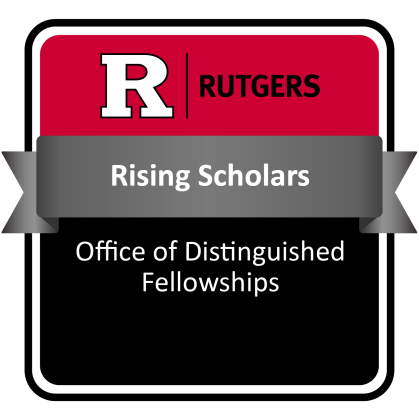Distinguished Fellowships Resources
Get started to explore your options and identify your goals to start your application process.
Getting Started
While many fellowships and rewards require a grade point average ranging from A- to A, selection committees are more impressed by applicants that demonstrate passion and commitment. Therefore, competitive fellowship candidates are those who, regardless of their year in school, already possess a fairly well-defined sense of what they want to accomplish with their lives, either intellectually or professionally, and most likely have already begun to take the firsts steps necessary to reach those goals. They are not simply a joiner, but rather are a hard-working and creative leader, an agent of change who identifies a problem then sets off to find its solution themselves.
Explore Your Options
We encourage you to begin exploring your options by reviewing the fellowships and scholarships listed in our fellowship selector tool. There are fellowships for all class years, including grad students and alumni.
Some fellowships require a Rutgers nomination or endorsement meaning you must apply through our office first. Other fellowships allow you to apply independently. Regardless of the specifications for the fellowship(s) you are considering, we encourage you to set up an appointment with one of our advisors for guidance throughout the application process.
Identify Your Goals
Fellowships are meant to put you on the fast-track to achieving your academic or professional career goals. Before applying to a fellowship, you should have a clear idea of the direction you want to head in. Consider your answer to the following questions: What kind of change do you wish to see in the world? How can your talents and interests help you make this change?
Your answer to these questions will give you an idea of potential paths to take, and the goals you set will help you identify which type of fellowship to apply to.
Work with an Advisor
There are hundreds of fellowships out there, and no two fellowships are the same. Each fellowship has specific requirements, qualities, interests, and goals among its recipients. Additionally, the application process varies by fellowship. Our expert advisors will work with you to determine which fellowships are a fit for you and provide support throughout each step of the application, submission, and interview process.



The Rising Scholars badge empowers you to take your commitment to fellowships to the next level. This badge validates your learning of fellowship fundamentals and gives you a way to share your acquired skills and knowledge online in a simple and verified way.
Earning criteria
- Attend either the Rising Scholars launch event in the spring or another Rising Scholars event.
- Attend two additional events that are either Rising Scholars or fellowships related.
- Complete the Rising Scholars Canvas course and exit survey.
Skills
assess fellowships fit | self-knowledge | relationship building | fellowship fundamentals | empowerment
Browse answers to common questions from students.
-
That depends on which fellowship we are talking about. The threshold for a few is set very high; others not as much. Many fellowships, even those considered among the most prestigious, have qualifying GPAs that can be described as reasonable. If you have a 3.0 grade point average or above, we encourage you to set up an appointment with our office and we will find at least one award for which you could apply.
-
Make an appointment with our office. Together we can sort out which of these fit best with what you have accomplished already and what you hope to accomplish in the future.
-
Absolutely. Students are encouraged to apply appropriately AND broadly. In other words, you should apply for every fellowship that will get you to where you want to go and with which your qualifications fit snugly. But remember, you never do yourself a favor when you force yourself into a fellowship competition in which you either clearly don’t belong or only barely.
-
Absolutely. Although it is best to start the process as early as possible, mustering a competitive application, like most things in life, is not about how long you work at it but rather how well. What matters most is that your qualifications meet the priorities of the fellowship, and since you think this particular fellowship is "perfect" for you, it is worth applying to. Set up a time to meet with our advisors as soon as possible.
-
Our office is a one-stop shop, and among the many things we supply, beyond encouragement, guidance, and support, is the institutional endorsement itself, written by the Director of Distinguished Fellowships on the candidate’s behalf. The institutional endorsement is one reason why it’s better to begin the process of applying as early as possible: The longer we have to get to know you, the better the letter that we write for you is likely to be. The same logic also applies to the recommenders you selected to write their own letters to support your candidacy.
-
As with so many things about fellowships, the answer here is: "it depends." Some fellowships encourage students to request letters of recommendation from high-ranking professors, while many others are more flexible than most people think. Since the applicants we work with are current or recent undergraduates, it makes sense to have Rutgers faculty represented in your recommendations. However, for some awards, it may be better to have someone from a volunteer organization or internship write for you.
The bottom line with recommendations is that they must be detailed, specific, supportive and enthusiastic. To receive a recommendation like this, you must choose someone who is willing and able to write the sort of letter described, whether the recommender is a professor or a supervisor. It is important that the recommender knows you well and likes you so that they can craft a great letter that is detailed, specific, supportive, and enthusiastic. If the substance of your relationship with a professor is nothing more than having received a high grade in her class, that is not enough to generate the quality of letter you are looking for and you should search elsewhere.
We can help you brainstorm about whom to ask and provide more information about the requirements of recommenders during advising.
-
This is truly one of our most frequently asked questions! Letters of recommendation are a major source of anxiety for most students. To make it easy on yourself and your recommenders, follow these tips:
- Talk to your potential recommender (in person or by video call) well in advance of the deadline -- at least one month is best.
- Provide your recommender with all the details about the fellowship and why you're applying for it, as well as how and when to submit the letter.
- Give them a copy of your resume/c.v. and possibly copies of your application essay drafts.
- Follow up a week before the deadline with a reminder and an offer to provide any additional information for them.
- Thank them! Let them know you appreciate their time, and let them know the results of the application.
One other common myth we'd like to clear up: you CAN ask the same recommender for letters multiple times! Once recommenders have a letter written, they can update it for a new opportunity and continue to support you.

